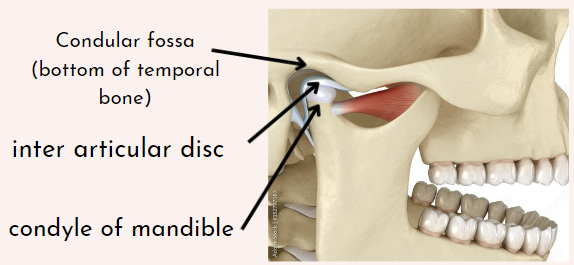Jaw Pain and Dizziness: 5 ways to Manage TMJ and dizziness
Jaw Pain and Dizziness: 5 ways to Manage TMJ and dizziness
Jaw pain and dizziness are related and have an interesting relationship. It can be challenging to know which one causes the other. This article outlines 3 ways TMJ and dizziness are related, including TMJ and migraine, and 5 ways to help mange TMJ pain and dizziness.
What is the TMJ?
TMJ stands for “temporomandibular joint”. This is where the mandibular fossa of the temporal bone of the skull and mandibular condyle of our jaw bone meet. This makes the joint we commonly refer to as the jaw. Some may say “I have jaw pain” and point to the TMJ, others may say “I have TMJ issues”.

3 Ways TMJ Pain and Dizziness are Related
The anatomy around our jaw includes a lot of important systems that are connected to dizziness and migraine. Read below to learn how jaw pain and migraine, jaw pain and dizziness, and jaw and neck pain are related.
- The muscles around the jaw and neck can refer pain to the ear. It may feel like there’s an ear infection starting, but it might actually be tightness in jaw or neck muscles, or inflammation around the TMJ.
- Inflammation of the TMJ can influence the fluid balance of the innter ear via the eustachian tube. This can result in an imbalance of the inner ear, which can result in dizziness.
- The trigeminal nerve stems from an area very close to our ear. The trigeminal nerve is involved in current migraine theory as a contributor to migraines and is connected to vestibular migraine. The trigeminal nerve is in charge of touch, temperature and pain sensations in most of our face. Part of the trigeminal nerves involvement in migraine is facial pain or pain behind the eye that some experience during a migraine attack.
How do I know if my Jaw pain and dizziness are connected?
The best way to find out if your jaw pain and dizziness are related is during an examination. If assessment of your jaw or neck recreate your symptoms or make current symptoms worse, it is something that should be addressed in your plan to improve your dizziness. Based on other findings from your exam, there might be other areas your provider would like to address first. In some cases, as other areas improve, TMJ or neck pain may improve naturally. If other areas start to improve but you’re still noticing TMJ or neck pain, then a more focused approach should be used. It’s an important conversation to have your with your medical team and your plan may change over time, so keep having those conversations!
5 ways to address TMJ Pain and Dizziness
- Practice Tongue and jaw resting position. Your teeth should not be touching when your mouth is closed and at rest. Jaw should be relaxed. Tongue should be resting on the roof of your mouth, not on the back of your teeth.
- Avoid sleeping on stomach. This places pressure on the TMJ and can contribute to pain and inflammation.
- Avoid unnecessary jaw strain/movements (resting your head in your hand, super chewy foods like bagels, taking large bites of food, nail biting, gum chewing etc.)
- Improve posture. Posture influences our neck and head position. Good posture can help address muscle tightness or poor jaw positioning that can impact TMJ pain. Good computer posturing is a great place to start. Computer moniotor should be be at eye level, keyboard should be where your arms can relax at your sides and your elbow makes a 90 degree angle, feet supported by the floor or stool to have knees at a 90 degree angle.
- Frequent movement breaks. Getting up every 30-45 minutes for a movement break or changing positions. This will help improve posture and allow muscles a change to relax and avoid stiffness or tightness.
- See a TMJ PT or TMJ specific dentist. Click here to use this directory to see if someone is near you.
Want to learn more about TMJ assessment, surveys, and TMJ exercises and other vestibular tools to get back to your daily life? Find out more at this link: https://thevertigodoctor.com/about-group/
Disclaimer:
Remember: this post is for informational purposes only and may not be the best fit for you and your personal situation. It shall not be construed as medical advice. The information and education provided here is not intended or implied to supplement or replace professional medical treatment, advice, and/or diagnosis. Always check with your own physician or medical professional before trying or implementing any information read here.
